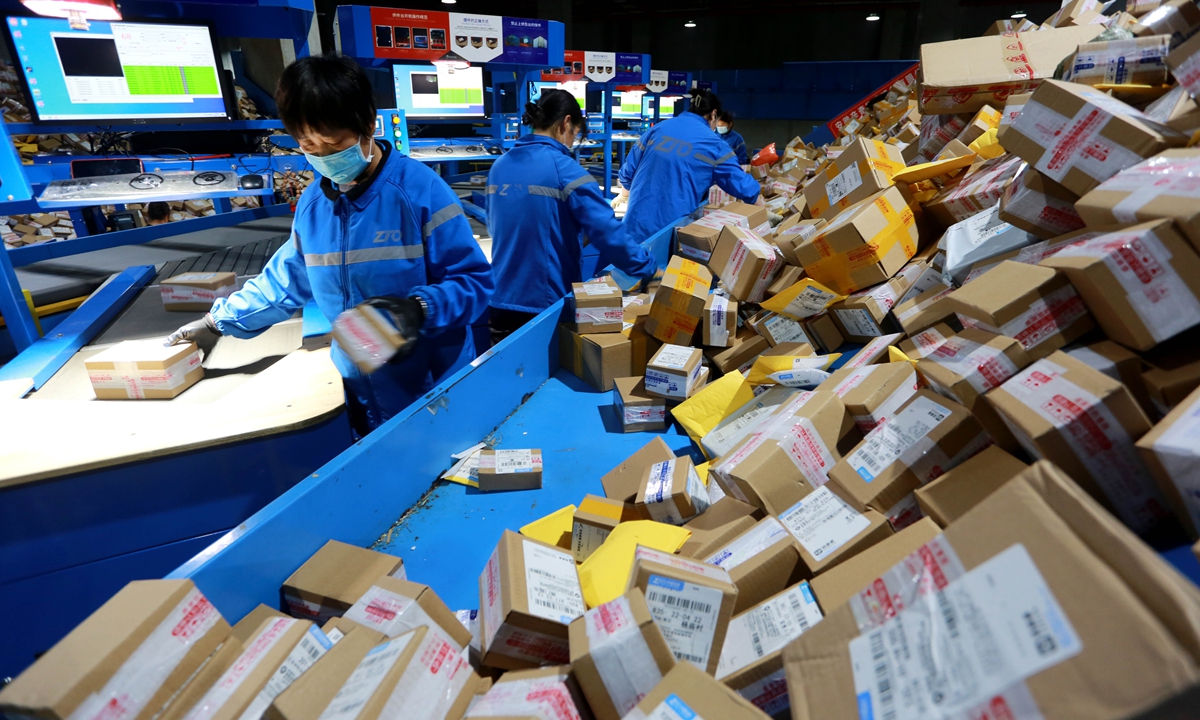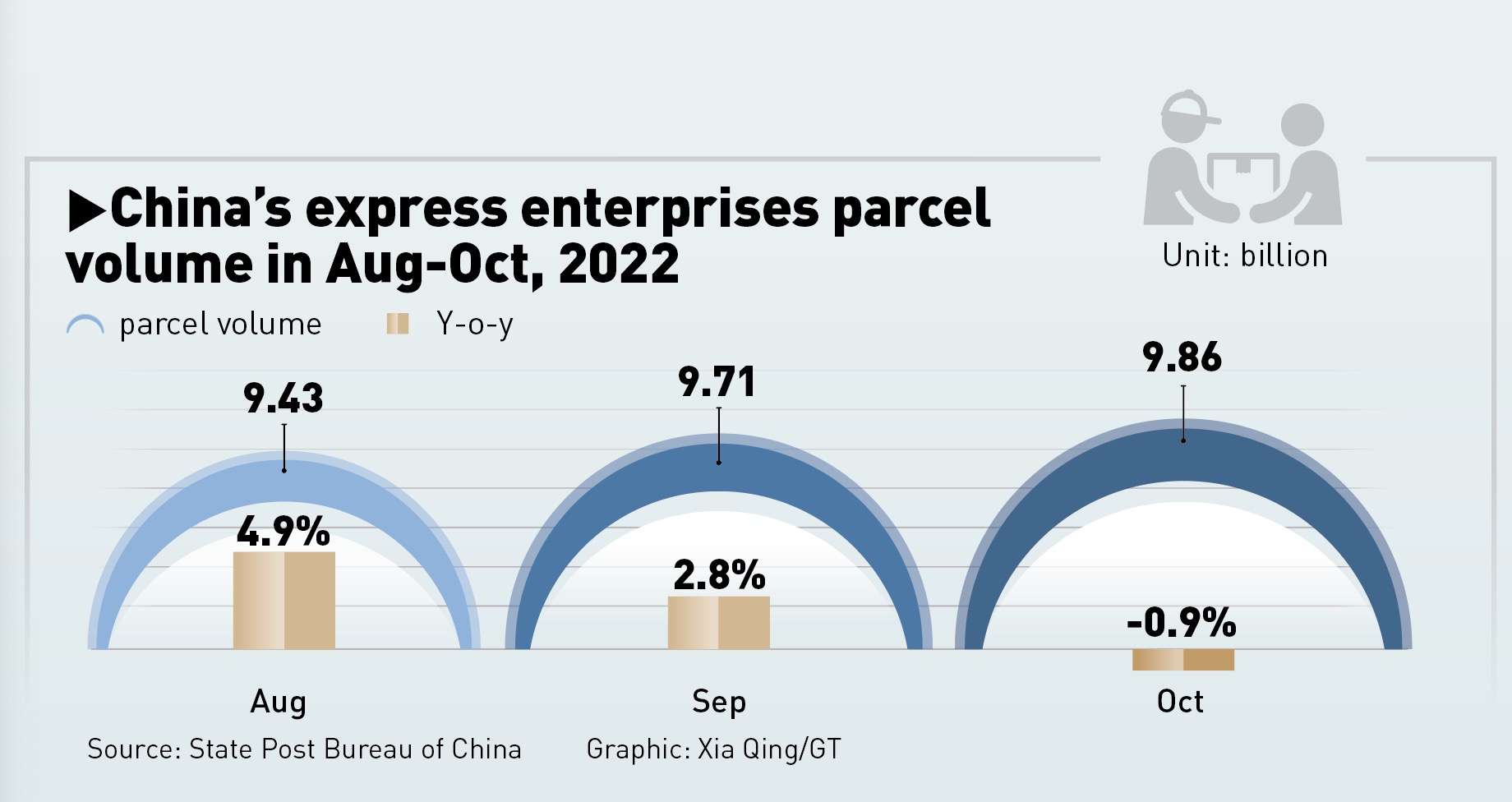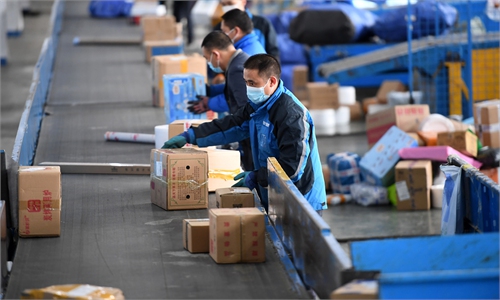China’s delivery volume hits 100 bln parcels faster than in 2021
Online retail-driven logistics recovery shows nation's potential consumption strength

Staff of a logistics company sort parcels at a distribution center in Lianyungang, East China's Jiangsu Province. Photo:VCG
On the first day of December, a box of honey pomelo sent from Zhangzhou to Xiamen, East China's Fujian Province became the nation's 100 billionth parcel shipped in 2022, a milestone which came seven days faster than last year, real-time monitor data by the State Post Bureau (SPB) revealed."I have been fond of pomelo since I was a child. Thanks to the rapid development of e-commerce and express logistics, I can buy the fruit online any time after I came to work in Xiamen. I feel very lucky to become the recipient of the 100 billionth shipment," said Mao, a consumer based in Xiamen, according to the official website of SPB.
Hard-won achievement
The 100 billionth threshold came seven days faster than last year, reflecting the resilience of the logistics sector and the country's robust consumer economy despite headwinds caused by frequent COVID-19 outbreaks and subsequent prevention measures.
Since the beginning of this year, the courier industry has withstood impact from multiple factors to ensure operations remain largely unaffected, and achieving 100 billion deliveries seven days ahead of schedule, which demonstrates the strong resilience of the industry and its positive contributions to keeping daily life running amid the COVID-19 epidemic, Lin Hu, an official with the SPB said.
It is hard to achieve the goal ahead of schedule as the courier sector has faced unprecedented pressure this year amid the ongoing epidemic, Lin said.
"We have spared no efforts to ensure smooth operations. We established a working mechanism and issued a series of policies to promote the resolution of problems such as terminal obstructions caused by the epidemic in various places," Lin said.
Courier service providers including SF Express and JD Logistics have strived to deliver parcels especially essential supplies under restrictive COVID-19 prevention measures.
Taking JD Logistics as an example, facing the severe and complicated epidemic situation in Southwest China's Chongqing Municipality in November, JD Logistics launched a new logistics supply guarantee model called "Hot Pot Bubble" in the city. Through the same operation unit as bubble, it ensured the closed-loop management for warehousing, sorting parks, express delivery stations and courier, according to a post the company sent to the Global Times.
Robots equipped with advanced technology such as visual perception and flexible obstacle avoidance were also deployed to realize 24-hour uninterrupted operation, which has improved the picking efficiency by over tenfold.
On Saturday, the national railway freight continued to operate at a high level, transporting 10.584 million tons of goods, a month-on-month increase of 3.75 percent. The volume of courier collection was near 307 million parcels, a month-on-month increase of 1.3 percent while delivery volume was about 296 million pieces, a month-on-month increase of 6.1 percent, data from the State Council showed.
Xu Yong, chief consultant with market research firm CECSS Express Consulting, told the Global Times on Thursday that despite that restrictive measures to prevent the spread of COVID-19 have severely disrupted logistics in multiple places, "we can see many people choose inner-city express or express in nearby areas to guarantee delivery."
There are also possibilities of "retaliatory consumption" when people who were once under lockdown can realize normal off-line spending, Xu said.
For the full year, Xu estimated around 20 percent growth of the express industry. "With more precise COVID-19 prevention measures in place across the country, it is expected that consumer spending will be fully unleashed," he noted.
China's express delivery firms handled 552 million parcels on November 11, the Double 11 online shopping festival, 1.8 times the usual daily average, data from the SPB revealed, underlining the strength of the country's consumer economy.
National retail sales came in at 36.06 trillion yuan ($5.1 trillion) in the first 10 months, up 0.6 percent on a yearly basis, according to the National Bureau of Statistics.

Graphic: Xia Qing/GT
Going rural
The rapid development of the logistics sector is often attributed to the high sales volume of online retails, farm products and cross-border e-commerce, along with industrial output, experts said, adding that agricultural products from rural areas represent a growing share of online spending.
The country has been actively tapping the potential of the rural market and help the revitalization of the countryside, Lin said.
More and more special agricultural products are connected to the national market through the large network of express delivery. While the major express delivery provinces in the east continue to maintain stable operations, the growth in the central and western regions has accelerated significantly, and the distribution of express delivery services across the country is gradually being optimized, according to the SPB.
Taking J&T Express as an example, in 2020, it launched specialty lines transporting high-quality and cheap agricultural and sideline products from rural areas to thousands of households in cities, helping farmers grow their income, and injecting strong impetus into rural revitalization. According to the latest data provided by the company, it has covered 147 counties across the country, transporting 137 types of agricultural specialties.
Express delivery services now cover almost all townships and more than 80 percent of administrative villages in China, according to recent statistics published by the SPB.
Ma, a vendor engaged in online sales of agricultural products, quit his job in an internet firm at the beginning of the year and devoted himself to the course in his hometown in Julu county, North China's Hebei Province, home to well-known specialties including golden-and-silver honeysuckle and wolfberry.
He told the Global Times that his businesses have grown rapidly thanks to the country's mature e-commerce infrastructure and convenient logistics network which are increasingly accessible in rural areas.
"More logistics are connecting farms goods in the countryside to people living in the cities. Logistics plus modern agriculture will soon represent a big market," he said.




